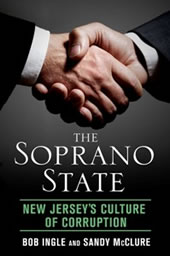

The
Soprano State Reading/Study and Book Club Guide |
|
INTRODUCTION The Soprano State details the you-couldn't-make-this-up true story of the corruption that has pervaded New Jersey politics, government, and business for the past thirty years. From Jimmy Hoffa purportedly being buried somewhere beneath the end zone in Giants Stadium in the Meadowlands, through allegations of a corrupt medical and dental university, through Mafia influence at all levels, to a governor who suddenly declares himself a “gay American” and resigns, the Garden State might indeed be better named after the HBO mobsters. Where else would: A state attorney general show up after police pulled over her boyfriend for driving with his seatbelt unfastened? A state senator and mayor of Newark (the same guy) spend thousands of dollars of taxpayers' money on a junket to Rio days before leaving office? A politically connected developer hire a prostitute to tape sex acts with his own brother-in-law and then send the tape to his sister? A U.S. senator about to run for governor break up with his union-leader girlfriend then give her a reported $6 million parting gift? Only in The Soprano State. It’s real, but it reads like fiction. And makes everywhere else seem downright normal. But The Soprano State is more than just a litany of strange New Jersey events. The book is a call to arms for taxpayers interested in cleaning up government, wherever political expediency has pushed ethical behavior into a darkened corner. THE AUTHORS Bob Ingle is a New York Times Best Selling Author, blogger, columnist, radio and TV news analyst, photographer, media critic and Twitter feeder read in 75 countries. He is hell on corruption and big on conservation. Sandy McClure is a multiple award-winning veteran reporter whose New Jersey statehouse stories, first for The Trentonian and then for the Gannett State Bureau, span three decades from Republican Gov. Tom Kean to Democrat Gov. Jon Corzine. She also spent two stints in Pennsylvania covering government and corruption for five newspapers. ASK THE AUTHORS Q. How long
did it take to write The Soprano State? Q. How can
two people write a book? Q. Whose hands
are on the cover? Q. What was
the hardest part? Q. Why do you
have footnotes? Q. What has
been the best part of the experience after the book came out? Q. Did you
have to leave anything out? Q. Why was
the manuscript cut? Q. How can
I know what happens next? DISCUSSION QUESTIONS In The Soprano State, Bob Ingle and Sandy McClure explain why New Jersey is the most corrupt state in the nation. What do you think makes New Jersey the worst? Or do you disagree? What similar problems do other states have? People who see political and government corruption at a state level often believe their own government representative is exempt from the corruption. Is that the way you feel? Does that contribute to the problem in New Jersey and other states? Because of his dramatic announcement, Jim McGreevey is probably the most well known New Jersey governor. Do you believe what he said? If not, why did he resign? What was the worst thing he did during his tenure as governor? If you could be the judge and the jury, how many years in jail – if any -- would you give John Lynch and Sharpe James? Who else in the book do you think should go to jail? For how long? In most states citizens look to law enforcement and the courts to protect their interests. In Chapter 5, the authors discuss the people named to the bench and to the post of attorney general. Do you think the New Jersey system is designed to look the other way when there is political corruption? What is the rational explanation for so many ill-equipped people in such jobs? Do appointments reflect badly on the people of New Jersey or the governor and state senate? Political bosses are the puppet masters behind the scenes, in effect choosing which candidates the voters get to vote for or against. Thus, an important decision is made before ballots are drawn. Is this something unique to New Jersey? After reading the chapter on Atlantic City and its mob influence, do you think gambling contributed to the corruption? If there were no gambling, would the mob still be there? What is the single worst example of corruption in New Jersey? Who could have stepped up to prevent it? Could it be prevented from happening again? In Chapter 10, the authors propose solutions to New Jersey’s corruption. Are they realistic? Can the problem ever be cured? What do you think will curb corruption? People are fleeing New Jersey. Is that the answer? Should they stay and fight for better, cleaner government? Will they take New Jersey’s corrupt system with them to other states? MORE ABOUT THE SOPRANO STATE For more information on The Soprano State and its authors and for updates of New Jersey corruption, visit http://www.thesopranostate.com.
|
|
